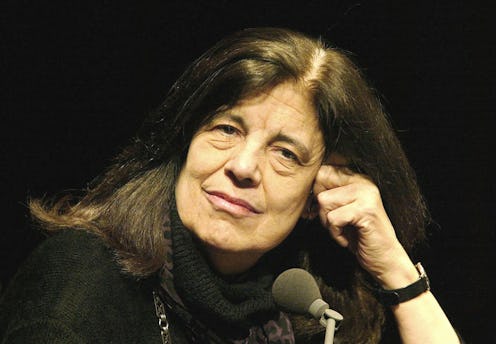Books
9 Sontag Quotes That'll Make You Feel Creative
As an undergrad English major at a small liberal arts college in the Midwest, it was only a matter of time until I was introduced to Susan Sontag. My sophomore year, in a cross-listed English and Media/Film Studies class, my professor paired a range of Oscar Wilde readings with Sontag's "Notes on Camp," an essay that perfectly coined so much of what Wilde enveloped. Her thoughts were both challenging and thrilling, and I was instantly drawn to read more.
Sontag's essays are what made her a well-respected writer and critique in the worlds of art and academia. She wrote about everything from the intersection of high and low art, to photography, to AIDS and other illnesses, and leftist ideologies. In her lifetime, Sontag published four novels, nine works of nonfiction (famously including On Photography, Illness as a Metaphor, and Regarding the Pain of Others), wrote and directed four films, four plays, and had countless essays and stories published in periodicals and journals. Oh, and on top of all this, she was a human rights activist for decades and the president of the American Center for Pen from 1987 to 1989.
Susan Sontag was larger-than-life, and her compassionate, complicated, and altogether dedicated voice lives on in her books, essays, speeches, letters, and interviews. Here are nine influential quotes from Susan Sontag's career that are sure to make anyone re-think the way they read, write, and study literature and culture:
On Writing and Literature
“My idea of a writer: someone interested in everything.”
—Regarding Susan Sontag, HBO Documentary
“To have access to literature, world literature, was to escape the prison of national vanity, of philistinism, of compulsory provincialism, of inane schooling, of imperfect destinies and bad luck. Literature was the passport to enter a larger life; that is, the zone of freedom. Literature was freedom. Especially in a time in which the values of reading and inwardness are so strenuously challenged, literature is freedom.”
—At the Same Time: Essays and Speeches
“To me, literature is a calling, even a kind of salvation. It connects me with an enterprise that is over 2,000 years old. What do we have from the past? Art and thought. That’s what lasts. That’s what continues to feed people and give them an idea of something better. A better state of one’s feelings or simply the idea of a silence in one’s self that allows one to think or to feel. Which to me is the same.”
—New York Times interview by Leslie Garis, 1992
On Criticism, Art, and Culture
“All aesthetic judgment is really cultural evaluation.”
—Reborn: Journals & Notebooks 1947-1963
“The aim of all commentary on art now should be to make works of art — and, by analogy, our own experience — more, rather than less, real to us. The function of criticism should be to show how it is what it is, even that it is what it is, rather than to show what it means.”
“All great art contains at its center contemplation, a dynamic contemplation.”
—Reborn: Journals and Notebooks, 1947-1963
On Solitude and Curiosity
“I want to be able to be alone, to find it nourishing — not just a waiting.”
—Reborn: Journals and Notebooks, 1947-1963
“Do stuff. Be clenched, curious. Not waiting for inspiration’s shove or society’s kiss on your forehead. Pay attention. It’s all about paying attention. Attention is vitality. It connects you with others. It makes you eager. Stay eager.”
—Vassar College Commencement Speech, 2003
On Books Worth Reading
“A novel worth reading is an education of the heart. It enlarges your sense of human possibility, of what human nature is, of what happens in the world. It’s a creator of inwardness."
—Paris Review Interview by Edward Hirsch, 1995
Images: Wyatt Counts/courtesy of HBO, New York Times Co./Archive Photos/Getty/courtesy of HBO, New York Times Co./Archive Photos/Getty/courtesy of HBO
